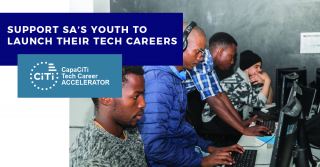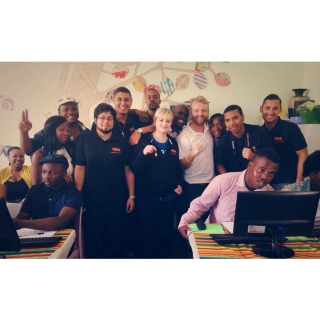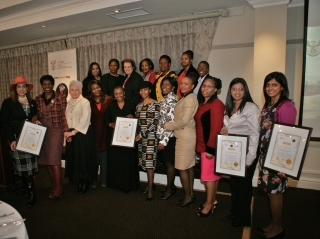Improving Your Communication Skills - Becoming a Better Speaker
By Devan Moonsamy, CEO of The ICHAF Training Institute
Effective presentation skills are vital for all who are or who aspire to be leaders. According to Forbes Magazine, certain presentations can be career defining.
Here are a few rules and tips for becoming a better speaker.
- Never wing it! If it’s important, or even if it would simply be some good practice, ensure you are fully prepared and that you practice what you are going to say numerous times.
- During your speech, don’t draw attention to your nervousness by speaking about it. People will quickly forgive and forget signs of nervousness, such as stuttering, if you stick to your topic. Focus on the task at hand, rather than your own shortcomings, and you will earn your audience’s respect.
- To counter nervousness, you must also ensure authenticity. Being yourself is much less stressful and more believable than trying to be someone else, so speak from your heart. Try to convey genuine warmth and a sense of contentment in order to make the audience comfortable with you. Calmness, combined with alertness, will also go a long way to winning the audience’s confidence.
- Ask yourself the following questions before you begin planning what you are going to say:
What am I trying to accomplish? What impact do I want to have on my audience?
For example, do you want to inform your team of new changes to your organisation or to motivate your clients to buy into your brand or do you need to persuade a potential employer of your ability to fulfil the role you have applied for?
Keep the ultimate purpose and desired outcome in mind from the preparation phases right through to the delivery. - Simplify everything. When we write sentences down, they tend to be longer than the sentences we would naturally say out aloud. If you are writing your speech down, bear in mind that convoluted, lengthy sentences will sound irregular when verbalised. Furthermore, condense your ideas and keep them simple so that they will be easier to follow.
- Consider the size of your audience and the context. Find out exactly where your presentation will be held and what is available for you to use. Prepare for background challenges, logistics and technical requirements.
- You may need to vary the subject and return to it again later if necessary so that you don’t bore the audience. For example, if you need to persuade a potential client to hire you, do not concentrate on yourself too much. Refer to the client’s needs, to the product or service and to the company you work for. Ask questions if possible and address the listener’s concerns.
- Use props sparingly, including PowerPoint slides. You need to hold the audience’s attention and keep their focus mainly on you. Make sure your slides do not diverge from what you are saying, or you will confuse your audience. All slides must be precise and easy to read, even for those who are right at the back of the room.
Record Yourself
A great way to make sure you are on the right track is to record yourself delivering the presentation. You will quickly pick up on problems you would not otherwise have noticed. You could do this for the next speech or presentation you need to give or as an exercise to practice and identify problems now. In the latter case, select a topic that you know quite a bit about.
Remember that the audience will notice your facial expressions, gestures and how you stand and move. When you watch the video, identify areas where you can use gestures or points at which you may lose the attention of the audience. Correct this by varying your vocal tone and adding some appropriate and tasteful humour and wit. If you slouch, the quickest way to correct this is the dancer’s trick of aligning the hip and pubic bones vertically.
Record yourself again and check that you are implementing the changes effectively.
Devan Moonsamy runs the ICHAF Training Institute, and he is the author of Racism, Classism, Sexism, And The Other ISMs That Divide Us, AND My Leadership Legacy Journal available from the ICHAF Training Institute.
ICHAF offers SETA-approved training in business skills, computer use, and soft skills. Devan specialises in conflict and diversity management, and regularly conducts seminars on these issues for corporates. To book a seminar with Devan or for other training courses, please use the contact details below.
Tel: 011 262 2461 | Email: This email address is being protected from spambots. You need JavaScript enabled to view it. | Website: www.ichaftraining.co.za | www.devan-moonsamy.com
B-BBEE TRAINING SOLUTIONS OFFERED BY CAD4ALL NATIONWIDE
Flexible, Affordable and relevant B-BBEE Skills development products which assists our clients in gaining the much-needed B-BBEE Scorecard points via Skills development, enterprise and supplier development as well as Holistic CSI initiatives.
he hassle- free B-BBEE solutions offered by CAD4ALL Corporate Training & B-BBEE Solutions includes a dedicated team of experts that manages the requirements imposed by legislation on behalf of all our clients who needs to comply annually CAD4ALL Corporate Training & B-BBEE Solutions manages the Human Resources and Industrial relations on behalf of our clients while remaining cognitive to the fact that our interventions must always be relevant to the client’s business and be aligned to their applicable legislation and policy.
Entering into a training agreement with a 100% LEVEL 1 Black woman owned entity like CAD4ALL which is accredited with the department of higher education and training as well as various SETAS, will contribute to much more rewards for the company partnering with CAD4ALL as well as tax rebates
- Our clients can take advantage of CAD4ALL being a first-time supplier to the company
- Enjoy maximum points gained at a low-cost due to initiative entry incentives such as tax rebates, youth subsidies and other allowed grants
- 135% maximum gain on procurement (Level 1), enhanced to 162% as a new supplier.
- Our end-to-end, full-service offers give you a range of solutions for all your BEE requirements
- We work with you to develop customized and strategic solutions designed to meet your exact needs
- Access to CAD4ALL Campus, the most innovative way to gain maximum points whilst avoiding a loss in staff productivity.
- Enjoy additional BEE points on Enterprise development, supplier development & CSI
- Our solution is closely aligned to the BEE codes of good conduct
- We offer qualifications across all industries – NQF Level 1 to 6.
- Through innovative initiatives and industry-firsts, we ensure that priority elements are met
- We are fully accredited to ensure your peace-of-mind and complete gain of Government incentives
View our video https://www.linkedin.com/feed/update/urn:li:activity:6541228811399372800 email This email address is being protected from spambots. You need JavaScript enabled to view it. for a B-BBEE information pack
Career risk mitigation - the way to go for corporate high flyers
By Michelle Moss*
Obsolescence. It happened to VCRs. It also happens to executives, even high flyers; especially the tunnel-vision variety that obsess about the job on hand. Obsolescence no longer takes decades. It can happen at pace as technologies change and businesses react to new legislation, heightened competition and more demanding customers. Forward-thinking executives increasingly realise they have to be fit for purpose today and in five years’ time. Obsolescence is a career risk and like any risk can be managed by putting proper mitigation strategies in place.
Talent search and management companies – so-called corporate head-hunters – face increasing calls from individuals for a heads-up on changing competency requirements.
Often, the request comes from the mid-life CEO, the high achiever who took a leadership role aged 45 and is determined to be in place (or to have moved on to bigger and better things) by the time he or she is 55. Competency-focused future-spotting is driven by the desire to mitigate the risk of a stalled career. However, parameters widen almost immediately.
Reference to relevant literature like the World Economic Forum’s ‘Future of Jobs Report 2018’ and the work of the MIT Initiative on the Digital Economy indicate that personal competencies are inextricably linked to the corporate future. The business or industry vision invariably shapes the personal quest for continuing relevance by individual executives. A global player like Riverwaves (a world leader in bespoke competency-based HR solutions) is close to these developments.
Alexandra Pascu, Riverwaves’ GM - Middle East and Africa, notes: “Customised competency models drive business strategy while delivering benefits across the board - at individual, HR department and organisational levels.” According to studies on the statistical validation of competency models**, the tangible return on investment includes a 63% reduction in staff turnover through increased employee satisfaction (attributable to greater clarity on performance expectations), a 19% improvement in employee performance and a 12.5% rise in sales and profits (a by-product of competency-based training).
Adoption of a bespoke competency model enables organisational vision and values to be translated into employee behaviour. According to Pascu, the corporate embrace of competency modelling has been accompanied by a global increase in demand for in-house competency training for line managers and talent professionals.
So, we see shared focus on future-ready skills by both the organisation and its people (including those in the C-suite). Individuals looking to avoid personal obsolescence increasingly find themselves working in a de facto partnership with organisations that are just as eager to stay current and relevant. The result doesn’t have to lead to a total immersion in new technologies. We may find ourselves working alongside robots and co-bots while dealing with digitisation and artificial intelligence, but very human attributes will make us special and keep us on top.
The World Economic Forum believes workforces will become even more diverse (multi-racial, multi-cultural and multi-generational with greater female representation). Orchestrating the input of ‘gig’ workers, freelancers, short-term project teams and consultants will be vital as structures become more flexible. Such scenarios help explain a quick competency to-do list suggested by MIT’s Erik Brynjolfssons. He advises us to put our focus on: Creativity Emotional intelligence (interpersonal skills, teamwork and leadership) Passion for our work Apparently, love never goes out of style. Not even love for what you do.
-- ENDS --
*Michelle Moss is a Director at Signium Africa (previously Talent Africa), a leading South African-based executive search and talent management company servicing sub-Saharan Africa. www.signium.co.za **Meta-analysis study reported in “The economic value of emotional intelligence competencies and EIC-based HR programmes”, Lyle Spencer. In Cherniss, C. and Goleman, D. eds.The Emotionally Intelligent Workplace: How to Select for, Measure, and Improve Emotional Intelligence in Individuals, Groups and Organisations. San Francisco, CA: Jossey-Bass/Wiley 2001.Spencer, Lyle, “Competency Model Statistical Validation and Business Case Development.”www.inscopecorp.com/resources-papers-statistics.aspx, 2004.
Website: www.signium.co.za
Tel: +27 11 771 4800
Support SA's youth to launch their tech careers
Make 2019 count. Hire interns for your team and give SA’s youth a boost into the tech sector.
Register your company’s interest by visiting www.citi.org.za or emailing us at This email address is being protected from spambots. You need JavaScript enabled to view it.
On 11 December 2018, in Cape Town at the CapaCiTi campus in Salt River, 340 young South Africans completed the technical training and received their certificates. They are now ready to be placed in tech internships in Cape Town and Johannesburg.
CapaCiTi, the Cape Innovation & Technology Initiative (CiTi)’s Tech Career Accelerator, has been preparing young people for the tech sector for 8 years, in 2018 scaling up to support youth and business in both Johannesburg and Cape Town. Now, they’re inviting SA business to interview these ambitious young future tech professionals for an internship starting in January.
Addressing a rising youth unemployment in South Africa, yet leveraging growing opportunities in the tech sector and for those with technology skills, CapaCiTi’s programmes are accelerated career pathways for previously unemployed youth. Key to this, is the commitment by SA businesses to create internship opportunities for youth to apply and grow their technical skills and confidence in the workplace. In turn, organizations are able to access temporary tech support for their teams and projects, particularly valuable at the start of a year.
“This year, CapaCiTi is proud to have equipped several hundred SA youth with the relevant training and coaching they need to accelerate their careers into the tech sector. We’re calling on South African businesses to support our future talent on the next six months of their journey, helping them to apply and build their skills and confidence and contribute to the digital economy. They’re ambitious, tenacious, and will add huge value to your teams as you kick off 2019. These young people are the future of South Africa’s tech sector, let’s all join together to help them start their journey towards a successful career that will be life changing,” states Fiona Tabraham, Acting Head of Skills Development, CiTi.
Since 2010, CapaCiTi has partnered with close to 150 leading organisations to hire interns and graduates. Corporates such as Media24, BCX, Absa have been strong supporters of interns and grads from the Accelerator, as well as a growing list of SAAS businesses, digital agencies.
“(Absa) has had tremendous success with the talented young people from CapaCiTi’s programmes. Since 2016, we’ve taken on 55 talented interns, and 16 going on to full-time employment with Absa, which we are looking to scale up significantly with CapaCiTi over the next few years. Their aptitude, attitude and aspiration has blown us away! They are hard-working, passionate about technology and creative, with the maturity to negotiate the trickiness of working in teams, as well as rise to the challenge when we put them in leadership positions,” states Alwyn van Wyk, Head of Cape Town Dev Shop, Absa.
The Interns:
CapaCiTi has a large group of youth completing programmes in December, ready to join business teams in January. These young people were all unemployed or under-employed when entering the programmes, and have now completed an intensive programme in a technical discipline relevant to skills in-demand in the tech sector. Importantly, they received coaching and skills training to prepare them for the 2019 workplace – critical and creative thinking, collaboration, presentation.
These ambitious young people are now ready to apply and amplify their knowledge during a 6-month internship, to gain the experience they need to land a tech job.
What they’ve learnt:
CapaCiTi’s programmes run from 9 to 12 months and are designed for matrics and graduates looking to start a career in IT.
The interns available to start in January 2019 in Cape Town and Johannesburg have completed an intensive training programme in the following:
Software Engineering – Trained in Java, Python [CPT & JHB]
Full-Stack Development – Trained in Full Stack Mobile Dev, Net, JavaScript, PHP, Android [CPT]
Java Development – Trained in Java, JavaScript [CPT & JHB]
Software Development (postgrad) – Trained Post Graduates with Java, JavaScript, HTML, CSS, PHP and MY SQL Databases [CPT]
CISCO Security –Trained and certified as a Cisco Network Security Associate [JHB]
ICT Infrastructure – Trained in IT Essentials, Routing and Switching, Linux Fundamentals, CCNA [CPT]
Company Hosts:
As a host, you will help cement the youth of South Africa’s futures in the business world.
Hosts will accommodate the trainees in their respective offices with access to a computer and involve them in work that allows them to grow their technical experience.
Hosts are required to pay a stipend to support their interns with transport and living costs.
Company Benefit:
Interns can support your teams with existing or new projects with data capture, database management, analysis, software testing, software development to administration, help-desk management. What’s important is that they are exposed to technical projects, team-work and ways of working that build their confidence and knowledge.
Join CiTi in supporting young South Africans to positively shape their future:
As a company partner to CiTi, allow these ambitious, motivated interns to contribute to your teams, and projects, where you need it most.
Help support South Africa’s youth to change their future by hiring talented tech interns for your team.To register your company’s interest in interviewing CapaCiTi interns or grads, please visit www.citi.org.za or email This email address is being protected from spambots. You need JavaScript enabled to view it. and indicate whether you are in Johannesburg or Cape Town, and the focus of your business.
Or contact directly:
Ilze King for Cape Town interns or grads: This email address is being protected from spambots. You need JavaScript enabled to view it. or
Estelle Langa for Johannesburg, PE or Durban interns or grads: This email address is being protected from spambots. You need JavaScript enabled to view it.
Don’t Go Without Solid Policies in Your Organisation Part I: Gender and BEE
Part I: Gender and BEE
By Devan Moonsamy, CEO of The ICHAF Training Institute
A sound policy structure in the workplace is an insurance blanket against many common problems. It protects both employer and employee. But having a great policy will make no difference if personnel are not aware of it. They should be expected to know, understand and follow its guidelines and rules.
Not all employees have the time to go through policy documents, however, and it can be tedious reading. The best thing to do is to give employees a summary of the policy. They can be asked to sign in agreement with the policy, which will encourage them to get to know its provisions well.
What works even better is to train employees on the policy, for example, by putting them through a workshop. This need not be a dreary affair. In fact, it can be really fun if approached in the right way and if it focusses on how the policy benefits the employee. The right facilitator can ensure staff understand, but don’t feel overburdened by the new policy provisions.
This is a very effective preventative measure which ensures employees know exactly what is expected of them and what their rights are.
People often focus a lot on what went wrong, especially reactively after a problem arises, such as a nasty incident between co-workers. But telling staff what they can and should be doing at work beforehand is more effective than just giving them a long list of what they can’t do. This helps them focus on being productive and getting along rather than worrying about how they might slip up.
Teaching and emulating good behaviour is also vital. Management sets the standard of behaviour. Employees never know everything they need to when starting a new job. There’s always things to learn, and it is extremely effective when one is taught the right behaviour as early on as possible.
The policy document itself is a critical backup. Staff members trained on key organisational policies can more firmly be held to account. If it’s in writing and it’s the company’s official stance on the matter, it makes it easier to handle problems in a mature, organised way. Risk Management planning has already been conducted and communicated by means of drafting and disseminating the policy, and training staff on it.
When staff are properly educated and trained, it greatly eases management’s concerns over their behaviour. What kinds of policies are important to have in place for South African businesses? In this first article we will look at two critical policies to create and train your employees and co-workers on.
Gender Equity Policy
The plight of women and girls in South African is an open secret. Everyone knows it is happening, but it remains well hidden. Nevertheless, the facts speak for themselves: women and girls are often in a difficult and subordinate position. They may have little say over their salaries, which jobs are open to them, and even over their very bodies.
Google recently got into serious trouble over pay inequities between male and female employees. The problem is severe enough that the US Department of Labour filed a lawsuit. Google tried to gloss over the problem, but experts quickly identified weaknesses in its approach, particularly in that it left out 11% of employees in an official gender-pay analysis.
PR Risk Management must not wait for disaster to strike. It can happen now by having good provisions in place which prevent these kinds of injustices. South African companies likewise must practice equal pay and benefits for equal work to redress the wrongs of the past.
Women also need to have an equal chance of being hired, promoted and trained. Women should not be seen as only fit for and kept in positions of ‘admin lady’ or ‘maid’. They must be invested in because they make great workers and very strong, effective and just leaders.
Women need to be heard in meetings, and they shouldn’t be expected to work harder than men just to be noticed or stuck under a glass ceiling. All this must be addressed in a gender equity policy document which HR and other staff members are well versed in and follow closely.
BEE Policy
This one goes without saying in South Africa, but staff do still need to understand what the company stance is with regard to BEE and why, and they must be monitored in following it. As Brand South Africa explains, ‘Black economic empowerment (BEE) is not simply a moral imperative... It is a pragmatic growth strategy to realise the country’s full potential by bringing the black majority into the economic mainstream.’
Various BEE provisions should be contained in the HR and recruitment policy, and the procurement policy. These include prioritising people of colour as much as possible in hiring, promotions, and buying decisions. A whole lot of black workers and a few white managers is still seen in some businesses. This must be addressed in binding policy to commit the company to equity measures. What specific BEE provisions do South African organisations have in place? A few helpful examples are given below.
Ithala Development Finance Corporation has in its BEE policy the provision that some contracts be sub-divided. This opens opportunities for black-owned SMMEs which may not yet have sufficient resources and staff to offer the most comprehensive services.
The Department of Trade and Industry emphasises that there must be active participation by black people in an enterprise for it to be considered as really following BEE principles.
Barclays Africa explains that it actively invites black-owned suppliers to participate in sourcing procedures. This has successfully helped the company to engage in business with more BEE companies.
NMMU’s policy makes BEE a key function of all managers. The University also measures the successful implementation of BEE in its employee performance assessments.
Tembeka Ngcukaitobi from Bowman Gilfillan notes that there is ‘No empowerment without skills.’ Skills development for all staff should be included in policy to meet BEE requirements.
The Shoprite Group/Checkers takes a very proactive approach by assisting new suppliers with creating barcodes and packaging so their products can be sold in stores. Every five years the employment equity plan is reviewed, and new targets are set to guide progress.
As a public company, Murray & Roberts has worked on its shareholder diversity, which now includes 59.53% black shareholders and 17.13% black women shareholders.
Besides these two key policies, companies should draft a disability policy, harassment and abuse policy, and have a training policy in place as well. We will look at these policies in detail in my next article on this topic. The organisational values, mission and goals are also commonly found in the first policy documents drafted, but don’t stop there. Draft additional policies with management input so as to protect the company and its employees. Proactively disseminate the most important policy messages using posters, emails, awareness drives, workshops, and training.
ICHAF is a training provider with years of experience in upskilling staff. We are ideally placed to conduct workshops and educate your staff on policies that will benefit all involved and protect the company from many PR and labour-related risks. Let us show your staff the way to boost their career and the company’s image through best practice policies.
For more information about training your staff:
Website - http://www.ichaftraining.co.za/
Facebook - https://www.facebook.com/TheICHAFTrainingInstitute/?ref=br_rs
Twitter - https://twitter.com/TheIchaf
For further comment from Devan Moonsamy you can email him on This email address is being protected from spambots. You need JavaScript enabled to view it. or contact him on 083 303 9159
Global consumer trends remixing executive DNA
BY: Annelize van Rensburg, Director at Signium Africa (previously Talent Africa) www.signium.co.za
Executive DNA is not immutable. Requirements shift. Profiles change. Business needs and economic conditions are obvious drivers, but societal factors, technology developments and the spirit of the times play a major role in how executives see themselves, their role and priorities.We are what we eat, but we are also what we read, think and feel.
What happens around us, shapes us. Executives are not elevated above the society they serve. They are rooted in it.Global trends research strongly supports this view, even when the primary focus is much broader than the executive head-hunter’s fixation with managerial skill and leadership potential.
Parallels between evolving executive profiles and changing consumer preferences are inescapable when consulting in-depth studies like ‘Megatrend Analysis (Putting the Consumer at the Heart of Business)’ by a market research firm like Euromonitor International.For instance, the world trend to ethical living and its direct consequence, ethical shopping, are echoed by the growing C-suite emphasis on personal values and adherence to well-defined moral principles.Companies and their leaders are held to a higher standard than the balance sheet. How you perform is not limited to how much profit you make, but how you respect people, communities and the environment.
Today, this broader yardstick is fully endorsed by those hoping to achieve leadership positions. They don’t want to work for businesses that cheat and blur ethical lines.In addition, consumer trends to healthy living and mental and spiritual wellbeing are closely aligned with growing emphasis by senior managers on a balanced lifestyle, with time for reflection, for family and for personal growth.Consumers are not the only ones focused on local produce, local sourcing and local alignment. Businesses and executives increasingly stress their commitment to communities and local schools and charities.Another major retail trend is s-commerce, with sidelights provided by the contemporary techno-savvy executive. Social media and social messaging influence the purchasing of the Net-enabled shopper. Simultaneously, familiarity with digital platforms has become a key characteristic of ambitious managers.They don’t delegate personal techno tasks to PAs.
These executives use Facebook, Twitter, Snapchat and other mobile messaging apps. Many make effective use of blog posts.They make themselves accessible, knowing isolation is impossible as well as undesirable when social media reach is global. Asia Pacific has more than half of the world’s Net users while three-quarters of the planet’s population is served by 3G telecom networks.Techno sophistication increases all the time. Smartphone users totalled an estimated 18.48 million in South Africa in 2017 and will top 25 million by 2022.Willingness to explore new media is accompanied by willingness to explore new markets.
Consumer researchers see this as recognition that market saturation forces change. Retail brands that made major inroads into China’s megacities now target mid-tier cities while other businesses are looking at new methods of reaching rural areas, whether in sub-Saharan Africa, Asia or South America.Similar flexibility is evident in the make-up of the modern executive.
Very few believe in 10 years’ time they will still be conducting business in the same way in the same market or that their current skill set will never need a makeover. Some look at radical career change and movement into totally new industries.Social shifts and fresh thinking are reconfiguring the attitudes and attributes of the current consumer … but you could say exactly the same of today’s flexible, adaptable and socially attuned executive.
Annelize van Rensburg is a Director at Signium Africa (previously Talent Africa), a leading South African-based executive search and talent management company servicing sub-Saharan Africa. She is also Leader of Signium’s Global Consumer Goods and Services Practice.
Joburg startup on a mission to democratize education
Education is too expensive and does not prepare students for the workplace. These are the lamentations of both employers and students across Africa. Why are educational institutions not changing their curricula fast enough to provide relevant education that satisfies industry skills demands? What do students really pay for when getting an education?These are some of the questions that Edzai Conilias Zvobwo has been asking for years.
Out of disgruntlement from the rhetoric and low pace of change, Edzai, popularly known as “The MathsGenius” has decided to be the change he would like to see.Edzai is on a mission to facilitate the free delivery of relevant skills to anyone who wants to learn. “In the information age, knowledge is free, and students are merely paying for accreditation and associated prestige that comes with institutional names”, said Zvobwo who has created an online platform that offers free courses and educational insights on all subjects.According to information on the platform’s homepage, MathsGee is an online content recycling initiative.
The platform serves as a bank for educational content in the form of courses.
The content on MathsGee is free for everyone, everywhere and anytime. The courses are being developed in conjunction with organizations that are willing to share knowledge and contribute in solving the educational crisis across the continent.To bridge the expectation gap between students and employers, it is necessary to co-create learning paths that are focused on skills and not necessarily labelled as degrees or diplomas.
What industry needs are skills and not qualifications. MathsGee offers this opportunity to employers to communicate their expectations to the future workforce to avoid discord.In line with the United Nations’ sustainable development goals, MathsGee is also tackling the exclusivity of education by providing all courses for free. If one has an internet connection, then they will be able to learn any skill anytime and anywhere.It is important that all stakeholders rethink about what education is relevant and how it should be delivered.
For more information on the initiative you can send an //mathsgee.com/joburg-social-entrepreneur-on-a-mission-to-democratize-education-delivery-in-africa/This email address is being protected from spambots. You need JavaScript enabled to view it.">email or simply use the “Contact Us” form on the platform.
Next executive challenge … co-opting the cobots
By Gusti Coetzer, director at Signium Africa (previously Talent Africa)
Future-spotting is a key strategic challenge for senior management. For those taking a forward-view, a new priority has emerged … how to react to the rise of the robots.Science fiction is fast becoming reality in manufacturing and service industries in the developed world. Businesses in Africa will have to follow suit if they hope to become competitive.
A 2016 study by the International Federation of Robotics says the number of robots sold globally with double to 400 000 units by 2018, with 70% of the demand coming from China, Japan, USA, South Korea and Germany.World Bank research says Africa has two industrial robots per 100 000 manufacturing workers and massively lags the developed world, but cannot ignore the trend.Jobs are a major focus point.
A widely quoted 2016 study by Daron Acemoglu (MIT) and Pascal Restrepo (Boston University) suggested bots would merely trigger the creation of new, better jobs.This year, they finished the first quantitative survey of job losses using real-world data. This less positive study shows bots cost 670 000 US manufacturing jobs between 1990 and 2007. In one local economy the academics scrutinised, each bot cut 6.2 jobs per 1000 workers.Acemoglu and Restrepo say US bot sales are expected to quadruple, so job losses could mount.Yet many companies that invest in robotics say they are hiring more as higher productivity drives company growth. People move to tasks with high value creation. Job losses at less automated competitors are hard to assess, however.Should executives worry? As blue-collar jobs decline, will executive numbers be decimated by machines gunning for top jobs?
Not likely …Any review of the literature confirms that humans always outscore machines when it comes to thinking, planning and decision-making. We can think ahead.
They can’t, however today artificial intelligence needs to be taken into account. It is arguably a “which came first, the chicken or the egg”?One commentator noted: “We can map out a series of steps that can lead us to a certain goal. This is what robots cannot do. They lack the ability to plan ahead of time.”Machines are faster, more precise, more consistent and more productive. Pressure on repetitive manufacturing jobs is already evident. But service sectors are not immune.One robotics application now flips burgers to consistent quality levels, with big implications for college dropouts who assume they can always get a job flipping burgers.The lesson is simple.
A good education and skills are essential for humans.In a paper to the International Management Conference in Bucharest, D.M. Florian noted: “Studies suggest robots are increasing our wages, not stealing our jobs, though there has been a decrease in the number of positions at some companies. However, the need for more qualified positions has gone up…“Technology has been proved to make humans smarter… A machine has no ability to assess situations and cannot look at a set of transactions and provide an overall picture of what they could mean.”Florian concluded: “Robots will only be able to support the problem-solving structure. They cannot replace it.”Many experts say man-versus-machine simplification is off the mark.
Man with machine is more probable. Growing sales of collaborative robots or cobots are reported worldwide.Here, one area of development is wearable robotics or exoskeletons that augment human capabilities with technology. ABI Research says about 40 R&D groups currently work in the field – the basis for a “$2-billion global market by 2025”.Military and healthcare applications are focus areas. So are industrial uses. Many firms are in the market for “motorised muscles” for heavy lifting or for sensor-actuated exoskeleton suits that “protect and serve” humans during dangerous work.In all cases, a trained and skilled person is needed to operate the wearables, hinting at a future in which humans work with cobots in many areas.Unskilled employment may therefore fall. You need skills to get the best out of cobots or “smart overalls” representing a big capex investment.The highly trained, well-educated cobot co-worker will become a major contributor to productivity and profit.
Executives will still find ‘man’ management is a key part of their task, but a new managerial style may be needed in this high-skill, high-knowledge environment.A very human, empathetic approach will be more appropriate than ‘command and control’. Ironically, the cobots could bring out our human side.
Website: www.signium.com
National Debt Advisors Makes Donation to Brothers for All Ex-Offenders’ Programme
National Debt Advisors
Tel. 021 007 1688
http://www.nationaldebtadvisors.co.za/
National Debt Advisors Makes a Donation to the Brothers for All Ex-Offenders’ Programme
Cape Town, Western Cape: The National Debt Advisors team took a daytrip to Langa Township on Friday, 13 March to visit the Brothers for All Coding Centre and make a donation of 10 desktop computers, after the Centre was burglarised.
The programme equips inmates, ex-offenders and vulnerable youth with computer coding and entrepreneurial skills, with a view to breaking the poverty-crime cycle that so many young South Africans are caught in. The Brothers for All Coding Centre was launched in September 2014 by rehabilitated ex-offenders, Sihle Tshabalala and Mzi Duda, who manage and run the Centre.
Founder of Brothers for All, Sihle Tshabalala said of the Coding Centre,
‘All of these computers are used to teach coding. It’s the first school in the continent that offers a computer science curriculum that is done in the township.’
CEO of National Debt Advisors, Sebastien Alexanderson addressed the students, explaining
‘The minute we found out that you guys had your computers robbed, we thought, let’s help out’.
The goals of this particular programme overlap with those of NDA, as they too are looking to provide South Africans with a better quality of life by improving their financial situations. Subsequently, NDA decided to donate their spare PCs to Brothers for All in support of equipping ex-prisoners with marketable skills, so they don’t have to resort to crime to support themselves financially.
Contact NDA at http://www.nationaldebtadvisors.co.za/contact-us/
To make a donation to Brothers for All visit http://www.brothersforall.org/donate
National Debt Advisors is a NCR regulated debt counselling firm offering official debt counselling and personal debt management services, as well as financial advice and budgeting guidance. NDA helps individuals all over South Africa to reduce their current debt, through a new restructured payment plan with their credit providers.
WOMEN ON BOARDS PROGRAMME ATTRACTS NOTEWORTHY BOARD VACANCIES
We are thrilled to announce that both the public and private sectors appear to recognize the value of board diversity as BPW SA has been approached in the last month alone, to assist with eleven board vacancies for women on our Register. Women and men have different interests and perspectives in important areas, and boards are starting to see the importance of utilising these varying experiences to tackle the tremendous challenges.
BPW SA and the Department of Trade & Industry (the dti) want boards of directors to widen the search for talent by looking beyond the traditional pool of executives and bring new potential to light. It is for this reason that we have joined forces to provide a Women on Boards programme to create a Register of female leaders in South Africa who are excellently trained and, as a result, are highly sought after by Boards. After all, why on earth would you voluntarily exclude half the smart people?
Our first group of 19 senior women, all thoroughly trained through our 9-month Women on Boards director development programme and certified by the dti, are now available on our register of Board Potential Women Directors and we urge companies to contact us for potential female directors.
Seven of our graduates are in line for board interviews , many have been interviewed by the media – both radio and magazines – and all will be profiled in the KZN Chamber of Commerce Power Book (2015). As an ongoing service to the graduates, BPW SA continues to raise their profile in an effort to access suitable board placements. We have proven that board diversity is not a supply problem, but rather a demand problem.
BPW SA is proud to announce that we have incorporated an international module into the Women on Boards programme. Business acumen - incorporating business finance and strategy - a must in today’s complex landscape. Business acumen is a keen understanding of what it takes for an organization to make money. It combines financial literacy – the ability to interpret numbers on financial statements – with business literacy – recognizing how strategies and decisions impact these numbers. Call it a sophisticated business simulation. Call it an exercise in experiential learning. Or call it a board game. Whatever you label it, the simple fact is that the training is fun and will gives participants a true competitive edge.
A recent Women on Board graduate, Tebogo Maziya, who holds a Masters degree in Science, a postgraduate diploma in finance and a B Comm degree says the nine-month journey has been fulfilling. “I learnt there’s a risk and that that risk is manageable. So it’s important for the board to be transparent and accountable and for a board member to be aware of decisions made because they will be held accountable.” Another graduate, Amantha Maharaj, a BSc electrical engineering graduate with an MBA, who works a top management level at an engineering consultancy says of the programme: “It teaches one to know how a board is structured, what to do, and questions one needs to ask when sitting on a board. It also teaches business risk and how one should view business from a higher level. It was certainly value for money.”
For more information about our Women on Boards Programme, please visit our website at www.bpw-jhbsa.co.za or contact us at This email address is being protected from spambots. You need JavaScript enabled to view it. or (011) 794-4991.











